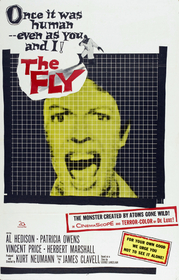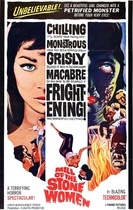Our editor-in-chief Nate Yapp is proud to have contributed to the new book Hidden Horror: A Celebration of 101 Underrated and Overlooked Fright Flicks, edited by Aaron Christensen. Another contributors include Anthony Timpone, B.J. Colangelo, Dave Alexander, Classic-Horror.com's own Robert C. Ring and John W. Bowen. Pick up a copy today from Amazon.com!
The Fly (1958)
I know there’s a whole camp, comprised primarily of the folks who’d say that House of Dracula blows Ravenous out of the water when it comes to horror, who think the 1958 version of The Fly is a masterpiece and the 1986 version is so much garbage on celluloid. Obviously, I’m not in that camp. I think that they’re both masterpieces.
For younger viewers, especially those generally familiar with horror and who might have seen the 1986 version of this film, there are a couple surprises. One, that the story in the original, while similar in its broadest features, is very different in the details, and has a very different focus. The second surprise is that Vincent Price is not the star of The Fly. If we asked someone roughly familiar with the David Cronenberg film and familiar with Price’s stature to guess, they’d probably say that Price would play Jeff Goldblum’s part. Instead, Price is a supporting actor, and his role is relatively minor, although of course it is a high quality performance and as support, the role is critical to the film.
One similarity in director Kurt Neumann’s masterful version is that we’re taken on a bit of a psychological adventure. But here, the subject of the breakdown is Helen Delambre, Professor Andre Delambre’s (the Goldblum part) wife. As The Fly opens, we see Helen in an industrial environment, walking away from a press that’s spilling over surprisingly gruesome (for the era), bright red blood. Helen calls her brother-in-law, Francois (Price), to tell him of the evil deed she just committed. Oddly, she’s not that upset, and Francois, and the authorities, quickly deduce that she must be insane. While all of this is going on, we see Helen being incredibly neurotic about flies that happen to be in her home. It’s all a bit of a mystery.
Neumann and writers George Langelaan and James Clavell perpetuate the mystery skillfully. We’re not quite sure what the story is, but we’re given enough information to make guesses. At the same time, we’re not so in the dark that we just become irritated and give up. This section of The Fly is sustained for some time, and when the moment comes that Helen reveals the shocking backstory, which is re-enacted instead of just re-told, and which ends up forming the bulk of the film, it’s the perfect moment for a release from the tension of the mystery.
If I had to compare the tone and structure of The Fly to something else, I think I’d have to compare it to Edgar Allen Poe. The Fly isn’t from a Poe story, but it is constructed as if it is, and it easily outdoes just about any actual Poe adaptation. The similarity means that you’re not going to see buckets of blood throughout the film, and there’s not a high body count. There also aren’t literal lurking monsters present most of the time. Instead, there’s a gradual, entrapping progression into an amazingly intriguing and literate story, told primarily through the eyes of an innocent bystander (Francois), and a profound horror in the psychological implications of a tragic series of events. That might rule out some horror fans right away, even fans of the Cronenberg Fly. There are similarities, but the Cronenberg film has more of a pay-off for gore fans.
Patricia Owens as Helen is the real star here, and her performance ability will have you buying her ever-faithful, obedient and loving wife without a second thought, despite its contrast with just about anything we know in popular culture post-"Leave It to Beaver." The Fly both nestles comfortably in 1950’s stereotypes but at the same time breaks them, with a realistic-seeming portrayal that’s complex and that’s probably the source of the stereotypes in the first place. David "Al" Hedison’s "mad-scientist" isn’t really mad, he’s just obsessed with his work, and it seems perfectly reasonable. Andre is a man on the verge of becoming the next Edison, Bell, or even more. Price’s portrayal of the brother-in-law has just the right combination of emotions to capture a man who just lost his brother to a possibly insane sister-in-law who he loves as much as his brother and his nephew. Herbert Marshall as Inspector Charas is never too overbearing or too lenient, and his final moment of realization is deeply disturbing.
The Fly was released in the midst of the 50’s monster-film craze, and make no mistake, it is an attempt to capitalize on that trend. But unlike most of those films, it never seems cheesy or campy, the science never seems like complete nonsense, and none of it comes across as unintentionally funny at this late date--even allowing for the relatively primitive special effects and the occasionally lampooned late scene involving a spider web. That scene isn’t silly here. It’s gut wrenching and horrific, exactly as it should be.









Great review. I saw this
Great review. I saw this movie in Durban, South Africa when I was just three years old. My aunties took my sister and I to the matinee session. Picture theatres are/were called bi-scopes. I always remembered that film. Particularly the ending where he's caught in the web at the park crying "help me" help me!' I thought it was a great idea/finish. Better than the remake.
Can't believe I was only three. My auntie placed her hand over my eyes with a open gap between her fingers so I could get a sneak at the part where the wife pulled the cloth off his head for the first time.
thanks for the memory!
I had seen the final scene
I had seen the final scene and monster parts since I was a kid on documentary and TV special, but just like you I first saw Cronenberg's take on the story first as a whole, and was pretty thrilled by the lush atmosphere, thrills and suspense of the original.
The murder mystery aspect was the main surprise for me, and it serves the story really well and add to the tragedy as we know from the start Professor Delambre had a gory end. The whole fun is to discover how, and just how much he's doomed.
In addition to the final spiderweb scene, the other very powerful one I found was Delambre final writing on the chalk board...
The final scene of "The Fly"
The final scene of "The Fly" has been lampooned and I never understood why. As a kid of 11 or 12 it left probably THE most lasting impression of any horror film I've ever seen...and I've seen 'em all. I was particularly disappointed to find out that Vincent Price and the policeman (whose name and character I can't recall) had a very difficult time shooting the scene due to their repeatedly breaking in to laughter. As for Cronenburg's version suffice it to say that I've only been able to watch it ONCE. Not because it was that bad but because of the effect the first viewing had on me. The scene where "Brundelfly" puts the shotgun held by Jeff Goldblum's real life girlfriend, Geena Davis, to his head is just too painful.
I really appreciate the
I really appreciate the comments of the previous reviewer. That final chalkboard scene, the horrible realization and reckoning at the spider's web -- I feel sorry for anyone who's so jaded by modern society that they are unaffected by the crippling tragedy of those scenes. A particularly emotional scene for me was the failed regeneration of the family's pet cat. Too haunting to forget.